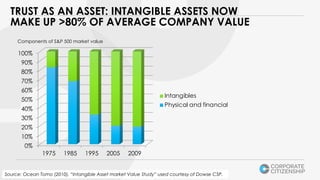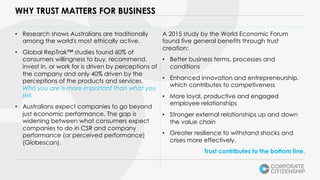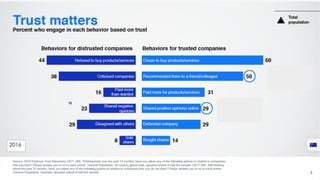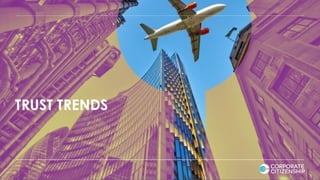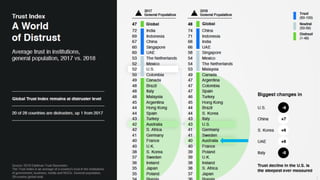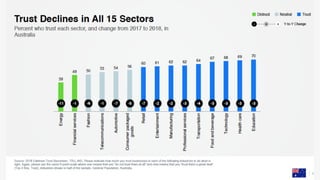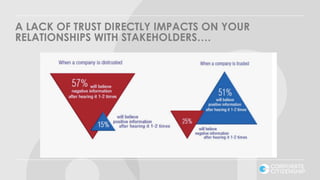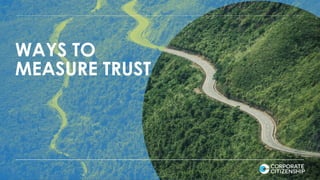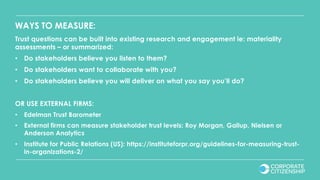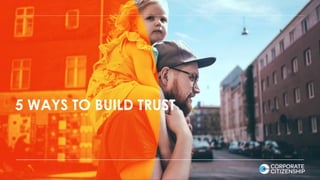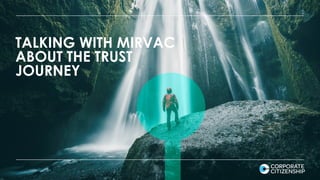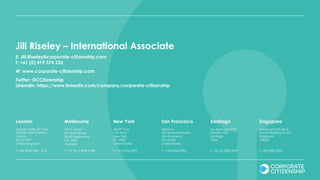Closing the trust gap: Responsible Business Series
- 1. RESPONSIBLE BUSINESS SERIES CLOSING THE TRUST GAP JILL RISELEY 26 OCTOBER 2018
- 2. A QUICK OVERVIEW: What’s TRUST? Noun: firm belief in the reliability, truth, or ability of someone or something. 1. Why trust is the new essential asset for business 2. Trust trends – globally and locally 3. The impacts of trust decline 4. Quick overview of ways of measuring trust 5. 5 things to drive trust in business Followed by: A discussion with Mirvac about its trust journey with Sarah Clarke. Trust is based on competence, benevolence, integrity, transparency, reliability and identification.
- 3. TRUST – THE ESSENTIAL BUSINESS ASSET
- 4. TRUST AS AN ASSET: INTANGIBLE ASSETS NOW MAKE UP >80% OF AVERAGE COMPANY VALUE 0% 10% 20% 30% 40% 50% 60% 70% 80% 90% 100% 1975 1985 1995 2005 2009 Intangibles Physical and financial Components of S&P 500 market value Source: Ocean Tomo (2010), “Intangible Asset market Value Study” used courtesy of Dowse CSP.
- 5. WHY TRUST MATTERS FOR BUSINESS • Research shows Australians are traditionally among the world's most ethically active. • Global RepTrak™ studies found 60% of consumers willingness to buy, recommend, invest in, or work for is driven by perceptions of the company and only 40% driven by the perceptions of the products and services. Who you are is more important than what you sell. • Australians expect companies to go beyond just economic performance. The gap is widening between what consumers expect companies to do in CSR and company performance (or perceived performance) (Globescan). A 2015 study by the World Economic Forum found five general benefits through trust creation: • Better business terms, processes and conditions • Enhanced innovation and entrepreneurship, which contributes to competiveness • More loyal, productive and engaged employee relationships • Stronger external relationships up and down the value chain • Greater resilience to withstand shocks and crises more effectively. Trust contributes to the bottom line.
- 6. 2016 72
- 7. TRUST TRENDS
- 10. In 2018, gap in Australia is still 15 points.
- 13. 2017
- 14. 2017
- 18. AUSTRALIA: DECLINE IN TRUST IN ALL INSTITUTIONS: Australians continue to lose trust in business (and other institutions). 2018 Trust Barometer (33,000 respondents across 28 countries) found: • Only 45% of people trust businesses. • 6 in 10 people believe CEOs should take the lead on change ahead of government, more need to stop hiding and stand up for societal causes. • 49% of people think companies only think about themselves. • 66% of people think CEOs are driven by greed. • 56% of people said they have no respect for CEOs who remain silent on important issues.
- 23. IMPACTS OF THE TRUST GAP
- 24. A watching brief in a changing world…
- 25. A LACK OF TRUST DIRECTLY IMPACTS ON YOUR RELATIONSHIPS WITH STAKEHOLDERS….
- 27. WAYS TO MEASURE TRUST: RESEARCHES AND ACADEMICS BELIEVE TRUST IS BASED ON: Competence – Do stakeholders believe you will deliver quality products and services? Reliability – Do stakeholders believe you will consistently do as you say? Integrity – Do stakeholders believe you will do ‘the right thing’? Transparency – Do stakeholders believe you are open and accountable? Benevolence – Do stakeholders believe you care and have their interests at heart? Identification - Have stakeholders heard of you before?
- 28. WAYS TO MEASURE: Trust questions can be built into existing research and engagement ie: materiality assessments – or summarized: • Do stakeholders believe you listen to them? • Do stakeholders want to collaborate with you? • Do stakeholders believe you will deliver on what you say you’ll do? OR USE EXTERNAL FIRMS: • Edelman Trust Barometer • External firms can measure stakeholder trust levels: Roy Morgan, Gallup, Nielsen or Anderson Analytics • Institute for Public Relations (US): https://instituteforpr.org/guidelines-for-measuring-trust- in-organizations-2/
- 29. 5 WAYS TO BUILD TRUST
- 30. In Australia, there is significant opportunity to increase trust through meeting the expectations on key drivers. 2016 Australian Results:
- 31. #1: BE A RESPONSIBLE BUSINESS! Starting with your own house (top 5 selected by respondents in 2017 Edelman): • Pay tax – don’t move profits offshore to avoid tax. • Don’t pay executives hundreds times more than workers • Move jobs offshore to cheaper labour markets. • Pay bribes (it’s illegal anyway!) • Overcharge for products that people need to live.
- 32. #2: BE A SUSTAINABLE AND SOCIALLY RESPONSIBLE BUSINESS How do you articulate clearly and consistently to stakeholders: • What is the purpose of your business besides profit? • How your company contributes to society? • Take a stance on social issues – business is expected to act. • Support local communities. • Protect and improve the environment. 77% of Australians felt “A company can take specific actions that both increase profits and improve the economic and social conditions in the community where it operates.”
- 33. # 3 – USE YOUR CEO TO COMMUNICATE THE SOUL OF THE BUSINESS. • 80% of Australians believe that CEOs should be personally visible in discussing societal issues. • 65% of Australians expect CEOs to take the lead on change rather than waiting for government. • Unscripted and authentic drives trust more than prepared and rehearsed. The gap is widening between public expectations and CEO perceived performance. And your CEO probably knows already! According to PWC - 63% of Australian CEOs rate trust as a major business issue. (2017)
- 34. #4 USE EMPLOYEES AND EXPERTS TO TELL YOUR STORY • Use your employees to tell the company story - 74% of Australian employees trust their employer (large jump in 2018). • Experts are trusted – the media is not. • NGOs are trusted advocates for your company. • Engage with your stakeholders directly.
- 36. #5 MAKE HAY WHILE THE SUN SHINES! “Trust takes years to build, seconds to break, and forever to repair.” Build trust when stakeholders believe you are authentic and not facing a crisis. “Never trust the advice of a man in difficulties.” – Aesop
- 37. QUESTIONS?
- 38. TALKING WITH MIRVAC ABOUT THE TRUST JOURNEY
- 39. Jill Riseley – International Associate E: Jill.Riseley@corporate-citizenship.com T: +61 (0) 419 374 235 W: www.corporate-citizenship.com Twitter: @CCitizenship LinkedIn: https://www.linkedin.com/company/corporate-citizenship London Holborn Gate, 5th Floor 326-330 High Holborn, London WC1V 7PP United Kingdom T: +44 (0)20 7861 1616 Melbourne Unit 3, Level 7 60 Albert Road South Melbourne, VIC 3205 Australia T: +61 (0) 3 8639 0548 New York 440 9th Ave 17th Floor New York, NY 10001 United States T: 1-212-226-3702 San Francisco 6th Floor 220 Sansome Street, San Francisco, CA 94103 United States T: 1-415-656-9383 Santiago Av. Kennedy 5735 Oficina 1503 Santiago Chile T: +56 (2) 3224 3559 Singapore 2 Science Park Drive Ascent Building, 01-03 Singapore 118222 T: +65 6822 2203




